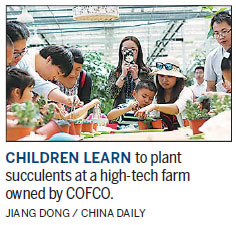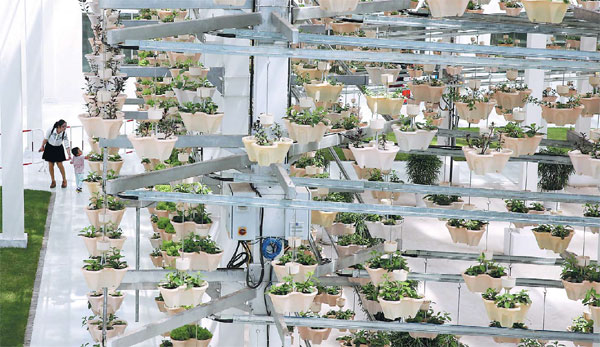Nurtured by nature

For those living in a city high rise, nature may seem far away, but now those with little idea of where that cabbage comes from can find out
As the man in the white lab coat talks quietly, a group of children surrounding him listen attentively.
"Vegetables usually grow from soil, but here we have vegetables growing from water and floating like little boats," the man says, pointing to cabbages beside him that are sprouting from a shallow pond. "That's because this is no ordinary water, but water that is nutrient-laden."
| Row after row of pot plants suspended from the roof with lines of various lengths are nurtured with the help of artificial lighting and a high-tech system that controls the temperature at a farm owned by COFCO. Jiang Dong / China Daily |
| From left: A man gives children the lowdown on growing cabbages; children living in cities rarely get close to nature. Learning about agriculture in the farm gives them a sense of where food comes from. Provided to China Daily |
Before he can say more he is deluged with comments and questions from the children, most of whom look younger than 6.
"Yes, pests and worms eat vegetables to sustain themselves, just as we do," the man says. "Because there are wormholes, it is likely that the vegetables are free of pesticides and so safe to eat. There are no pests on the vegetables here because the vegetables are cultivated without soil."
We are not flies on a wall in an elementary school science class, but visitors to a high-tech farm owned by China National Cereals, Oils and Foodstuffs Corp, the country's largest state-owned agricultural company.
Every weekend and during holidays, the farm, 38 kilometers south of Beijing, is swarmed by visitors young and old, mostly parents with young children, eager to get in touch with a side of life that - a few parks notwithstanding - seems to be missing in the city: nature.
Instead, they turn their back on other forms of entertainment such as going to the movies or shopping, jump into their cars and head out of the city bound for this indoor farm, which covers more than 80,000 square meters and resembles a science museum.
Here they will find row after row of potted plants suspended from the roof with lines of various lengths, nurtured with the help of artificial lighting and a high-tech system that controls the temperature.
In dedicated cultivation rooms, they can see rare species, such as lingzhi (Ganoderma lucidum), an expensive mushroom that many Asians believe has special life-giving properties.
There are plants from tropical areas and greenhouses planted with many types of flowers and succulent plants.
Outside there are grasslands, and fields in which vegetables, fruit and flowers are grown.
Just in case this heavy dose of nature proves to be a little too much, there are family game areas inside and outside, including a theater and a basketball court.
However, at the root of all this is the eagerness of COFCO to educate, and to help children better understand the science of agriculture. Farm workers escort the families around and explain how various technologies are applied. There are free classes in which children are taught how to transplant young plants, putting them in a pot in such a way that they will have the best chance to survive and thrive.
"We visit the farm at least once a month," says a Beijing resident surnamed Sun. "My son loves this place because there are so many different kinds of plants, and many that he can touch.
"Children living in cities have scant opportunity to get close to nature. Even in parks, plants and animal species are scarce, and you're often not allowed to touch the plants."
The family first visited the farm this past winter. While other parks were almost devoid of anything green, the farm had an abundance of green plants on display, and that impressed the family, Sun says.
Since then, the family has often visited the farm and has told friends about it."My son is only 3, and he is curious about nature and all the plants he sees," Sun says. "He often asks questions I don't know the answer to, but at the farm there are detailed explanations about vegetables and other plants, and the staff are patient in answering his questions."
The air is fresh and clean, scented with the fragrance of the flowers and other plants, Sun says.

But most importantly, he says, his son is learning about agriculture even as he is having fun, and it gives him a sense of where food comes from, nourishing his curiosity about agriculture and nature generally, a precious experience that city children lack.
For grown-ups, the farm not only offers a place to get away from city life, but also gives people the chance to experience modern agricultural technology, Sun says.
"Living in cities people are usually just too busy to care about things that they feel have no relevance to them. We never care about how vegetables are grown; the only thing we seem to care about is whether they are labeled organic or green.
"But once you are in such a high-tech farm, it just becomes natural to be curious."
Like Sun, many city dwellers are showing increasing interest in farming and agricultural technologies. Wang Mian, co-owner of Nature-dance, a farm in the suburbs of Beijing that uses biological technology to cultivate healthy and pesticide-free vegetables and fruits, says the farm appeals to people not only because it supplies healthy, chemical-free food, but also because people are interested in the technology it uses.
Wang co-founded the farm in 2012 in south Beijing, then moved it to north Beijing, where there was more space.
His farm uses organic fertilizers instead of chemical ones. It also uses various predator insects to prevent and control pest damage. Many of the predators are imported, and domestic laboratories also donate some.
Wang established the startup because he found most of the so-called organic products on the market were not organic at all, but used a profusion of hormones and pesticides, and since the farm was set up it has generated a buzz among agriculturalists. Researchers from across China have offered him free guidance and support, he says.
Customers can buy produce on a one-off basis or pay a six-month or annual fee for membership to have it delivered to their homes every week. The farm offers free lectures on biological technology it uses, and encourages people to work on the farm.
"Many people come to the farm to find out more about the technology we use, and some come very often," Wang says, adding that the farm is looking for financing to expand, and will begin raising pigs, chickens and edible insects this year.
After Wang Qian, a Beijing housewife, visited the farm she decided to pay thousands of yuan for an annual membership.
Previously, a relative gave her vegetables from the farm, which she describes as having the "flavors of childhood".
"I was stunned the first time I took a bite of one of the farm's tomatoes," she says.
"They were so delicious, and the taste and texture were exactly what tomatoes were like when I was little, and I became curious about how they did it."
In big cities, vegetables and fruit come from far away, and to reduce loss during transport they are often not ripe when they are picked, so they lack flavor, Wang Qian says.
She paid for a membership because the farm delivers healthy, fresh and in-season fruit and vegetables delivered to the members' families at least twice a week, but also because she is curious about its farming methods.
"The farm opened a new world to me, when I found out that it uses predators to prevent insects," says Wang Qian, who has a 3-year-old son.
She grew up in the countryside and believes nature has it own cycle for everything, but she had never given it that much thought, she says.
For example, a friend keen on eating healthy food used to grow tomatoes on a plot of land she leased, but the tomatoes always fell off the plants before they turned red. She mentioned it to staff members at the farm, and they explained that it was probably because the tomato had not been pollinated by wasps, which do not inhabit the area.
Red tomatoes on the market pollinated otherwise are not red when they are harvested, and ripeners are used to make them turn red, she was told.
After having seen aphids on the farm, she plans to read up on them. They are minute bugs that feed by sucking sap from plants and reproduce rapidly, causing great damage to crops.
Her son, whom she takes to the farm once or twice a week, enjoys it immensely, she says, and he is curious about everything he sees.
"For him, seeing crops growing in the fields or in greenhouses, touching and feeling them, is a special experience. It's not about him having to learn anything; the main thing for him is to have the experience."
Wang Qian says she is thankful that she grew up in the countryside, so she feels close to nature and curious about it even though she lives in a big city.
Wang Mian, the founder of the farm, says the farm has worked with schools from the beginning to teach children about crops and agriculture through classes. It also provides free tours to families and school students, which have proved popular.
"I have to say we did that mostly because we want to promote our idea and educate the market, but I was astonished at people's craving for agricultural knowledge and experience."
Wang Mian says that deep down nearly everyone, particularly those in big cities, hankers to get close to nature.
Getting close to crops and soil matures children and benefits everyone emotionally and psychologically, he says.
liuzhihua@chinadaily.com.cn
(China Daily European Weekly 07/22/2016 page1)
Today's Top News
- Chinese landmark trade corridor handles over 5m TEUs
- China holds first national civil service exam since raising eligibility age cap
- Xi's article on CPC self-reform to be published
- Xi stresses improving long-term mechanisms for cyberspace governance
- Experts share ideas on advancing human rights
- Japan PM's remarks on Taiwan send severely wrong signal
































